直接引语变间接引语详细讲解加练习 (1)
直接引语变间接引语方法
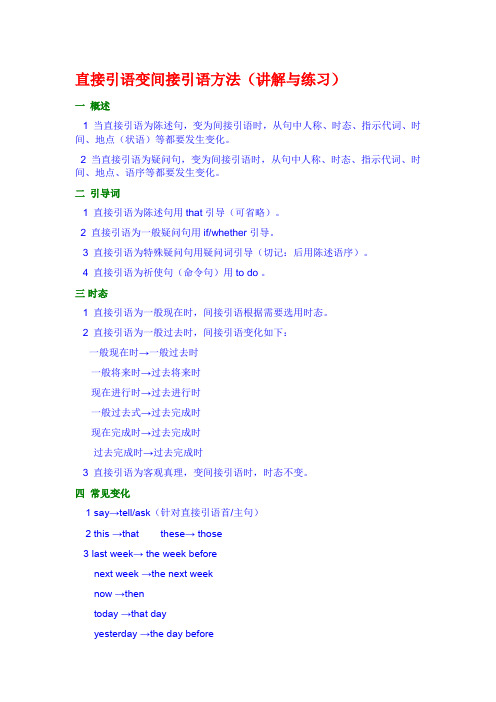
直接引语变间接引语方法(讲解与练习)一概述1 当直接引语为陈述句,变为间接引语时,从句中人称、时态、指示代词、时间、地点(状语)等都要发生变化。
2 当直接引语为疑问句,变为间接引语时,从句中人称、时态、指示代词、时间、地点、语序等都要发生变化。
二引导词1 直接引语为陈述句用that引导(可省略)。
2 直接引语为一般疑问句用if/whether引导。
3 直接引语为特殊疑问句用疑问词引导(切记:后用陈述语序)。
4 直接引语为祈使句(命令句)用to do 。
三时态1 直接引语为一般现在时,间接引语根据需要选用时态。
2 直接引语为一般过去时,间接引语变化如下:一般现在时→一般过去时一般将来时→过去将来时现在进行时→过去进行时一般过去式→过去完成时现在完成时→过去完成时过去完成时→过去完成时3 直接引语为客观真理,变间接引语时,时态不变。
四常见变化1 say→tell/ask(针对直接引语首/主句)2 this →that these→ those3 last week→ the week beforenext week →the next weeknow →thentoday →that dayyesterday →the day beforetomorrow →the next daya day ago →a day before4 here →there5 come →go引述别人的话有两种方式:一是使用引号引出人家的原话,这叫做直接引语;一是用自己的话把人家的话转述出来,这叫做间接引语。
例如:John said, "I'm going to London with my father."约翰说:"我要和父亲到伦敦去。
"(引号内是直接引语)John said that he was going to London with his father.约翰说,他要和他父亲去伦敦。
直接引语变间接引语(宾语从句)讲解与练习(附答案)

直接引语变间接引语(宾语从句)讲解与练习一.讲解:在复合句中,作宾语的句子(主谓结构)就叫宾语从句。
直接引语变间接引语多数情况下构成宾语从句。
变化时应注意以下几点:1.引导词(连词)①如果直接引语是陈述句,变成间接引语,引导词用that, that没有实际意义,口语或非正式文体中常省略He said, “My mother is a doctor.”→He said (that) his mother was a doctor.②如果直接引语是一般疑问句,变成间接引语,引导词就用if。
不能省略“Are you English”He asked me→He asked me if I was English.③如果直接引语是特殊疑问句,变成间接引语,引导词就用特殊疑问句的疑问词,如:whatwhen where which who how等,这些词有意义,不能省略:eg “How old are you ” He asked me→He asked me how old I was.二.间接引语的宾语从句中,引导词之后都必须使用陈述语序,即“引导词+主语+谓语…),肯定式的宾语从句不用助动词do(did或does) .She asked, “What does he want”→She asked what he wanted.He asked me ,“Do you like English”→He asked me if I liked English.三.时态的变化:1.如果主句中的谓语动词用一般过去时,则间接引语中宾语从句须用过去的某种时态。
基本原则是:往过去的方向推一个时态,即一般现在时变成一般过去时,现在进行时变成过去进行时,一般将来时变成过去将来时eg:①He asked me, “Do you have a dictionary”→He asked me if I had a dictionary.②She asked, “What is Tom doing →She asked what Tom was doing.③She said ,“I will leave a message on his desk.”→She said that she would leave a message onhis desk.2.如果宾语从句表达的是客观真理,自然现象。
宾语从句(直接引语变间接引语)的讲解与练习

宾语从句(直接引语变间接引语)的讲解与练习各种句型的直接引语改成间接引语时的相应变化:一、将下面的句子连接成为含有宾语从句的复合句。
1.These flowers are from Guangdong. He said.He said _______ these flowers _______ from Guangdong.2. Light travels faster than sound. My teacher told me.My teacher told me _____ light _______ faster than sound.3.There will be a meeting in five d ays. Jack didn’t know.Jack didn’t know _____ there _____ ____ a meeting in five days.4.Can they speak French? I want to know.I want to know ______ _______ _______ _______ French.5.Are the children playing games? Tell me.Tell me ______ the children ______ ______ games.6 What's his name? I asked him.I asked him what _____ _____ _____.二、选择填空。
( ) 1. What did Mike say? He said ____________________.A. if you are free the next weekB. what colour was itC. the weather is fineD. summer comes after spring( ) 2.Peter knew _______________.A. whether he has finished reading the bookB. why the boy had so many questionsC. there were 12 months in a yearD. when they will leave for Paris( )3. Could you tell me ___________?A. where do you liveB. who you are waiting forC. who were you waiting forD. where you live in( )4. I can't understand ______the boy alone.A. why she leftB. why did she leaveC. why she had leftD. why had she left( )5 The manager came up to see __________.A. what was the matterB. what the matter wasC. what the matter isD. what's the matter( )6. He asked his father _______.A. where it happensB. where did it happenC. how it happenedD. how did it happen( )7. No one tells us______, so we need your help.A. how we should doB. what should we doC. how to do itD. what to do it( )8. Could you please teach me _______ the computer.A. how checkB. to checkC. how to checkD. to how checking三、用合适的连接词填空。
(完整版)直接引语改为间接引语

(完整版)直接引语改为间接引语直接引语改为间接引语基本方法及例句基本方法1、改标点①把“冒号”改成“逗号”②去掉“双引号”2、改人称(一般情况下)③把“我”改成“他”/“她”把“我们”改成“他们”/“她们”④把“他”/“她”改成“我”把“他们”/“她们”改成“我们”⑤把“你”改成“我”/“他”/“她”⑥把“你们”改成“我们”/“他们”/“她们”(根据说话的对象决定)3、检查句子,添加/减少/修改一两个词语,使句子意思通顺,表达合理举例说明这些句子分成三类:①××对我说……1、直接引语是直接引用别人的话,而间接引语则是转达别人说的话,因此,直接引语改为间接引语时,说话人即第一人称“我”要改为第三人称“他”或“她”。
如:张童对我说:“我一定要坚持长跑锻炼。
”改:张童告诉我,他一定要坚持长跑锻炼。
2、当转述内容涉及其他人称时的改法。
如:姐姐对我说:“你说得对,我就这样做。
”改:姐姐告诉我,我说得对,她就这样做。
上面的例句中涉及了第二人称,在改为转述句时就应改为第一人称。
还应注意,冒号和引号前的内容不变。
②我对××说……如:我对小王说:“你的成绩总是名列前茅,我要向你学习。
”改:我对小王说,他的成绩总是名列前茅,我要向他学习。
③××对××说……如:妈妈对爸爸说:“我明天要去开会。
”改:妈妈对爸爸说,她明天要去开会。
妈妈告诉爸爸,她明天要去开会。
直接引语和间接引语句子训练文章摘要:本文章的主要内容是关于直接引语和间接引语句子训练,欢迎您来阅读并提出宝贵意见!直接引语和间接引语(转述句和陈述句)1.直接引语是直接引用别人的话,而间接引语则是转达别人说的话,因此,直接引语改为间接引语时,说话人即第一人称“我”要改为第三人称“他”或“她”。
如:张童对我说:“我一定要坚持长跑锻炼。
”改:张童告诉我,他一定要坚持长跑锻炼。
2.当转述内容涉及其他人称时的改法。
直接引语变间接引语 详细讲解

考点直接引语和间接引语直接引用别人的话叫直接引语,用自己的话转述别人的话叫间接引语。
直接引语前后加引号;间接引语不必加引号。
间接引语有以下三种情况构成宾语从句,有两种情况变成不定式形式。
1.直接引语是陈述句时,变成间接引语就用宾语从句形式。
如:He said, “ I’m a student.”他说:“我是一名学生。
”❼He said he was a student.他说他是一名学生。
2.直接引语是一般疑问句时,变成间接引语形成if或whether引导的宾语从句。
如:He asked us,” Have you finished reading this book?”他问我们:“你们读完这本书了吗?”❼He asked us if/ whether we had finished reading that book.他问我们是否我们已经读完了这本书。
3.直接引语是特殊疑问句时,变成间接引语形成宾语从句。
如:The teacher asked,“Where are you going next week?”老师问:“下周你们要去哪儿?”❼The teacher asked where we were going the next week. 老师问第二周我们要去哪。
注意:当直接引语为特殊疑问句变间接引语形成宾语从句时,首先要注意用特殊疑问词,其后用正常语序的句子,同时注意人称、时态、时间状语的变化。
a.4.直接引语是肯定的祈使句时,变成间接引语时要用不定式形式。
如:①.Our parents told us“Learn English well!”我们的父母告诉我们:“把英语学好啊!”❼Our parents told us to learn English well. 我们的父母告诉我吗要把英语学好。
②.The teacher ordered them, “ Do that again.”老师命令他们说:“重做!”❼ The teacher ordered them to do that again.老师命令他们要重做。
直接引语变间接引语语法讲解及专项练习(含答案)
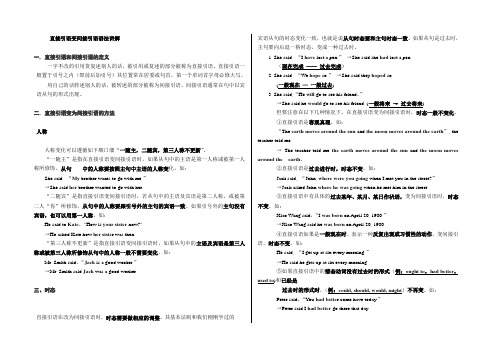
直接引语变间接引语语法讲解一. 直接引语和间接引语的定义一字不改的引用货复述别人的话,被引用或复述的部分被称为直接引语。
直接引语一般置于引号之内(即前后加引号)其位置常在居委或句首,第一个单词首字母必修大写。
用自己的话转述别人的话,被转述的部分被称为间接引语。
间接引语通常在句中以宾语从句的形式出现。
二. 直接引语变为间接引语的方法人称人称变化可以遵循如下顺口溜“一随主,二随宾,第三人称不更新”。
“一随主”是指在直接引语变间接引语时,如果从句中的主语是第一人称或被第一人称所修饰。
从句中的人称要按照主句中主语的人称变化,如:She said. “My brother wants to go with me.”→She said her brother wanted to go with her.“二随宾”是指直接引语变间接引语时,若从句中的主语及宾语是第二人称,或被第二人“你”所修饰,从句中的人称要跟引号外的主句的宾语一致。
如果引号外的主句没有宾语,也可以用第一人称,如:He said to Kate,"How is your sister now?"→He asked Kate how her siste r was then.“第三人称不更新”是指直接引语变间接引语时,如果从句中的主语及宾语是第三人称或被第三人称所修饰从句中的人称一般不需要变化,如:Mr. Smith said,“Jack is a good worker.”→Mr. Smith said Jack was a good worker.三、时态直接引语在改为间接引语时,时态需要做相应的调整。
其基本法则和我们刚刚学过的宾语从句的时态变化一致,也就是说从句时态要和主句时态一致。
如果从句是过去时,主句要向后退一格时态,变成一种过去时。
1. She said. “I have lost a pen.”→She said she had lost a pen.(现在完成——过去完成)2. She said. “We hope so.”→She said they hoped so.(一般现在—一般过去)3. She said,“He will go to see his friend。
直接引语变间接引语(1)

直接引语是 特殊疑问句 ,间接引语用 连接代词 (what∕which∕who∕whose等)或连接副词 (where∕how∕when∕why等)连接主从句,后面跟陈述语序。
eg:“What are you doing”Ted 直接引语为特殊疑问句 应改为:Ted asks me asks me.
与主句宾语me人称一致为第一人称 ③直接引语为第三人称时,变为间接引语人称不变。
eg:“He will come here today,”she says.
直接引语为第三人称 应改为:She says that he will come here today.(间接引语仍为he没变)
二、时态的变化
•
what
连接词
•
I am doing. 陈述语序
练习: A.把下列直接引语改为间接引语。
• • • • • • • • • 1.‘I will get a card from Jimmy,’Peter says. 2.‘I have just arrived,’Grandmother says. 3.‘He can't write very well,’ Lucy says. 4. ‘Are you a doctor,’she asks me. 5‘I have a headache,’he says. 6.‘Is that all,’she asks me. 7.‘I'm thirsty,’Mary says. 8.They tell us,‘It's time to have lunch.’ 9.He says,"I will water the flowers this afternoon.”
根据第一条:一随主 应改为:She says that she will go to Tokyo.
直接引语变间接引语(宾语从句)讲解与练习(附答案)知识讲解

直接引语变间接引语(宾语从句)讲解与练习一.讲解:在复合句中,作宾语的句子(主谓结构)就叫宾语从句。
直接引语变间接引语多数情况下构成宾语从句。
变化时应注意以下几点:1.引导词(连词)①如果直接引语是陈述句,变成间接引语,引导词用that, that没有实际意义,口语或非正式文体中常省略e.g He said, “My mother is a doctor.”→He said (that) his mother was adoctor.②如果直接引语是一般疑问句,变成间接引语,引导词就用if。
不能省略 e.g “Are youEnglish?” He asked m e→He asked me if I was English.③如果直接引语是特殊疑问句,变成间接引语,引导词就用特殊疑问句的疑问词,如:whatwhen where which who how等,这些词有意义,不能省略:eg “How old are you ?” He askedm e→He asked me how old I was.二.间接引语的宾语从句中,引导词之后都必须使用陈述语序,即“引导词+主语+谓语…),肯定式的宾语从句不用助动词do(did或does) e.g.She asked, “What does he want?”→She asked what he wanted.He asked me ,“Do you like English?”→He asked me if I liked English.三.时态的变化:1.如果主句中的谓语动词用一般过去时,则间接引语中宾语从句须用过去的某种时态。
基本原则是:往过去的方向推一个时态,即一般现在时变成一般过去时,现在进行时变成过去进行时,一般将来时变成过去将来时eg:① He asked me, “Do you have a dictionary?”→He asked me if I had a dictionary.② She asked, “What is Tom doing? →She asked what Tom was doing.③ She said ,“I will leave a message on his desk.”→She said that she would leavea message on his desk.2.如果宾语从句表达的是客观真理,自然现象。
直接引语和间接引语转换练习题(附答案)

直接引语和间接引语转换练习题(附答案)第一部分:将直接引语转换为间接引语
1. "我会去看电影" 她说。
答案:她说她会去看电影。
2. "我们应该尽快出发," 他们告诉我。
答案:他们告诉我他们应该尽快出发。
3. "我已经完成了工作," 她说。
答案:她说她已经完成了工作。
4. "我们很快就会回来," 他们保证道。
答案:他们保证很快就会回来。
5. "我非常爱那部电影," 她说。
答案:她说她非常爱那部电影。
第二部分:将间接引语转换为直接引语
1. 父亲说他晚上没时间看电视。
答案:"我晚上没时间看电视",父亲说。
2. 她告诉我她正在与朋友聊天。
答案: "我正在与朋友聊天," 她告诉我。
3. 他告诉我今晚他不会加班。
答案:"今晚我不会加班," 他告诉我。
4. 她说她已经吃了晚饭。
答案: "我已经吃了晚饭," 她说。
5. 他告诉我他明天会去纽约。
答案: "明天我会去纽约," 他告诉我。
结论
正确的直接引语和间接引语的使用可以使我们的文本更加简洁、易于理解。
有时候我们需要将别人说或写的话转化为自己的语言风格,因此掌握这些技能很重要。
直接引语和间接引语讲解及练习
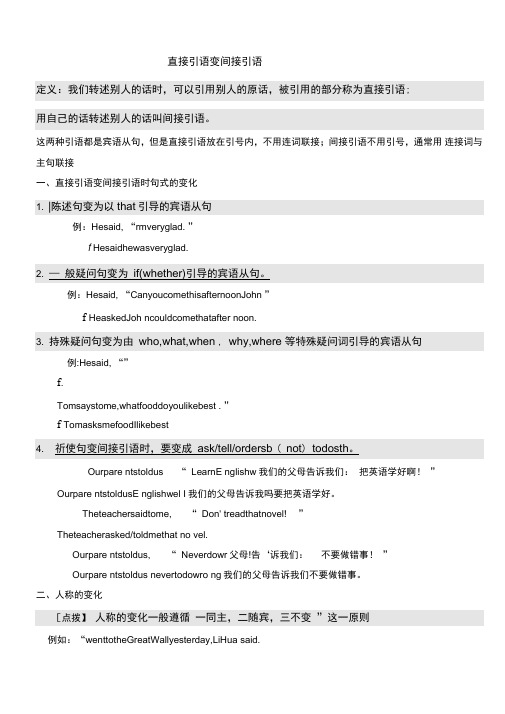
直接引语变间接引语这两种引语都是宾语从句,但是直接引语放在引号内,不用连词联接;间接引语不用引号,通常用连接词与主句联接一、直接引语变间接引语时句式的变化例:Hesaid, “rmveryglad. ”f Hesaidhewasveryglad.例:Hesaid, “CanyoucomethisafternoonJohn ”f HeaskedJoh ncouldcomethatafter noon.例:Hesaid, “”f.Tomsaystome,whatfooddoyoulikebest . ”f TomasksmefoodIlikebestOurpare ntstoldus “ LearnE nglishw我们的父母告诉我们:把英语学好啊!”Ourpare ntstoldusE nglishwel I我们的父母告诉我吗要把英语学好。
Theteachersaidtome, “ Don' treadthatnovel! ”Theteacherasked/toldmethat no vel.Ourpare ntstoldus, “ Neverdowr父母!告‘诉我们:不要做错事!”Ourpare ntstoldus nevertodowro ng我们的父母告诉我们不要做错事。
二、人称的变化例如:“wenttotheGreatWallyesterday,LiHua said.f LiHuasaidthathehadg on etotheGreatWallthedaybefore.“ llcometohelpyouwheneveryouneedmyhelp ” hanswerecher. f Hean sweredherthOtewouldcometohelpherwhe nevershe neededhishelp.Shesaidtome, Yourpronunciationisbetterthanhis.”f Shetoldmethatmypro nun ciatio nwasbettertha nhis.三、时态变化主句的谓语动词是一般过去时, 从句的谓语动词在时态方面要做相应的变化, 推一个时态四、指示代词、时间状语、地点状语和动词的变化【拓展延伸】直接引语变为间接引语时时态不作改变的情况Hesays, “I ' mtired. ”f Hesaysthatheistired.Hewillsay, “ Theboywaslazy. ”f Hewilltellyouthattheboywaslazy.Ourgeographyteachersaidtous, “ Theearthgoesro un dthes un.f Ourgeographyteachertoldusthattheearthgoesro un dthes un.Shesaid, “ Iwasbio1995.”f Shesaidthatshewasbor nin 1995.【典型例题】(1)Canyoutellme ______(2) _____________________________ Thephysicsteachersaidtheearth aroundthesun. 【语法专练】附:Unitl短语归纳1. 做个好朋友tobeagoodfriend2. 做下列调查makethefollowingsurvey3. 合计总分addupthescore4. 得分getpoints5. 心烦意乱地来到学校cometoschoolupset6. 不理睬铃声ignorethebell7. 使你那个德国朋友平静下来calmdow nyourGerma nfrie nd8. 关心你朋友beconcernedaboutyourfriend(s)9. 松开了getloose10. 不得不去户外遛狗havegottowalkthedogoutdoors11 .帮他期末考试作弊helphimcheat in thee nd-of-termexam12. 列出理由makealistofreasons/listthereasons13. 记下一连串的请求setdownaseriesofrequests14. 根据问卷调查accordingtothequestionnaire15. 根据编辑的忠告accord in gtotheeditor ' sadvice16. 为了分担你的困难inordertoshareyourdifficulties/troubles17. 与老板相爱fallinlovewiththeboss18. 与我的同桌相处融洽getalong/onwellwithmydeskmate19. 关心青少年beconcernedaboutteenagers20. 为了和老板面对面地交流ino rdertocom muni catewiththebossfacetoface21. 信任政府trust/believeinthegovernment22. 经历了太多的战争gothroughtoomanywars23. 相邻的城镇neighboringtowns24. 相邻的国家neighboringcountries直接引语变间接引语练习题一、将所给直接引语变为间接引语,每空一词:1. “Inevereatmeat. ” hesaid.Hesaidthat _____ never ______ m eat.2. “ I ' vefoundmywallet. ” hesaidtome.He _____ m ethathe _________________ wallet.3. “ Itookithomewithme. ” shesaid.Shesaidthat __________________ ithomewithher.,“ Thes un rises in theeasta ndgoesdow nin thewest. ”Theteachersaidthatthesun _____ intheeastand _____ dow nin thewest.5. “ Imetheryesterday. ” hesaidtome.He _____ m ethathe _____ mettheday _____ .6. “Youmustcomeherebeforefive. ” hesaid.HesaidthatI _____ togo _____ b eforefive.7. “Iboughtthehouse10yearsago. ” hesaid.Hesaidthathe ______ boughtthehouse10years ______ .8. “Didyouseeherlastweek ” hesaid.He __________ Ihadseenhertheweek ______ .,“YoucansithereJim. ”He _____ J imthathe _____ sitthere.,“ Howdidyoufindit,mother ” Heaskedhermother fo un dit.11. “Wherehaveyoubeenthesedays” heasked.Heaskedme ___________________ been _______ days.12. “Doyouknowwhereshelives ” heasked.Heasked __________ knewwhereshe _____ .13. “Stopmakingsomuchnoise,children. ” hesaid.He _____ t hechildren ___________ makin gsomuch no ise.14. “Don ttellhimthenews. ” shesaid.Shetoldme _________________ himthe news.15. “lamhavingsupper, ” hesaid.Hesaidthat _____________ h av in gsupper.16. “I ' veseenthefilm, ” Ginasaidtome.Gina ______ methatshe _____________ t hefilm.17. “ Iwenthomewithmysister, ” shesaid.Shesaidthat ____________________ homewithhersister.18. “Keepquiet,children. ” hesaid.He ______ t hechildren ______________ q uiet.20. “Don tlookoutofthewindow, ” shesaid.Shetoldme ____________________ outofthewi ndow.家庭作业1. “Iamhavingsupper, ” hesaid.Hesaidthat _____________ h av in gsupper.2. “ I ' veseenthefilm, ” Ginasaidtome.Gina ______ m ethatshe ______________ t hefilm.3. “Iwenthomewithmysister, ” shesaid.Shesaidthat ____________________ homewithhersister.,“Thesunisbiggerthanthemoon. ”Theteachersaidthatthesun _____ biggertha nthem oon.5. “ Imetheryesterday, ” hesaidtome.Hetoldmethathe ______ methertheday ______ .6. “Youmustcomeherebeforefive, ” hesaid.HesaidthatI ______ togo ______ beforefive.7. “Iboughtthecomputertwoweeksago, ” shesaid.Shesaidthatshe ______ boughtthecomputertwoweeks ______ 8. “Didyoureadthebooklastweek ” hesaid.He ____________ Ihadreadthebooktheweek ______ .,“YoucansithereJim. ”He ______ J imthathe _______ sitthere,“ Howdidyoufindit,mother ” Heaskedhermother fo un dit. 11. “Wherehaveyoubeenthesedays” heasked.Heaskedme ____________________ been _____ days.12 “Doyouknowwhereshelives ” heaskedme.Heaskedme _____________ knewwhereshe ______ .13. “Keepquiet,children. ” hesaid.He ______ t hechildren _____________ quiet.14. “Don tlookoutofthewindow, ” shesaid.Shetoldme ____________________ outofthewi ndow.15. “Areyouinterestedinthis ” hesaidtome.Heasked _____________ Iwasinterestedin ______ .。
直接引语变间接引语【附答案解析】

直接引语变间接引语专项练习题间接引语的三要素:1.引导词2.语序3.时态人称变化间接引语的四种情况:主语+谓语+(引导词)宾语从句(注意语序)1)主语+谓语+陈述句(引导词that 可以省略)2)主语+谓语+一般疑问句(if/whether…引导)3)主语+谓语+特殊疑问句(特殊疑问词引导(what,how等)4)祈使句→ask/tell sb.(not) to do sth.1.人称变化例1:He said: “I like it very much.”He said that he liked it very much.总结:直接引语为第一人称时,间接引语一般为第三人称。
例2:He said to Kate: “How is your sister ?”He asked Kate how was her sister.总结:主语为第二人称,间接引语中人称跟引号外的主语一致例3:Mr. Smith said: “John is a good student.”Mr. Smith said John was a good student.总结:主语为第三人称时,间接引语中人称一般不变化。
归纳:一随主,二随宾,第三人称不更新。
2.时间、地点变化:He said, “I lost a key here yesterday.”He said that he had lost a key there the day before/the previous day.“I read the book here a week ago,”Jane said to him.Jane told him that she had read the book there a week before.She said, “I’ll come here again tonight.”She said she would go there again that night.May said to Tom, “I’ll bring some photos here to you tomorrow.”May told Tom she would take some photos there to him the next day. Practie11. “I went to the Great Wall yesterday,”Li Hua said.→Li Hua said that he had gone to the Great Wall the day before.2.“We have to finish our experiment, ”they said.→They said they had to finish their experiment.3.“You speak English very well.”the teacher said to me. →The teacher told me I spoke English very well.4.My teacher said, “she is a good student.”→My teacher said she was a good student5.She says,”I will go to Beijing next month.”→She says she will go to Beijing the next month.时态变化:1)例句分析He said, “I can do well in English.”He said that he could do well in English.He said, “I'm writing a letter.”He said that he was writing a letter.“I saw her last Monday,”he said.He said he had seen her the previous Monday.“I have seen her before,”said he.He said he had seen her before.He said: “I had finished my homework.”He said he had finished his homework.Tom said to me “I will call you tomorrow.”Tom told me that he would call me the next day.总结:I. 将所给直接引语变为间接引语,每空一词:1. “I never eat meat.”he said.He said that ______ never ______ meat.2. “I’ve found my wallet.”he said to me.He ______ me that he ______ ______ ______ wallet.3. “I took it home with me.”she said.She said that ______ ______ _______ it home with her.4. The teacher said, “The sun rises in the east and goes down in the west.”The teacher said that the sun ______ in the east and ______ down in the west.5. “I met her yesterday.”he said to me.He ______ me that he ______ met the day ______.6. “You must come here before five.”he said.He said that I ______ to go ______ before five.7. “I bought the house 10 years ago.”he said.He said that he _______ bought the house 10 years _______.8. “Did you see her last week?”he said.He ______ ______ I had seen her the week _______.9. He said, “You can sit here, Jim.”He ______ Jim that he ______ sit there10. He asked, “How did you find it, mother?”He asked her mother ______ ______ ______ found it.11. “Where have you been these days?”he asked.He asked me _______ _______ _______been _______ days. 12. “Do you know where she lives?”he asked.He asked ______ ______ knew where she ______.13. “Stop making so much noise, children.”he said.He ______ the children ______ ______ making so much noise.14. “Don’t tell him the news.”she said.She told me _______ ______ ______ him the news.15. “Are you interested in this?”he said.He ______ ______ I was interested in ______.【参考答案】1. he, ate2. told, had, found, his3. she, had, taken4. rise, goes5. told, had, before6. had, there7. had, before 8. asked, if [whether], before9. told, could 10. how, she, had11. where, I, had, those 12. if [whether], I, lived13. told, to, stop 14. not, to, tell15. asked, if [whether], thatII.巩固练习:1. Our teacher asked us _____ our dictionaries to school.A. bringB. broughtC. bringD. to bring2. The teacher told the boy students ______ football on the grass.A. not playB. not to playC. playedD. playing3. ____ Tom didn’t go to school?A. Do you know howB. Why do you knowC. How you know whyD. Do you know why4. She looks sad. Could you please tell me _____ that prevents her from being as happy as before?A. what it isB. it is whatC. how it isD. it is how5. Betty asked her sister ____ to the railway station to see her off.A. not to comeB. not to goC. to not comeD. to not go6. The pupil asked his teacher _____ round the earth.A. weather the moon goesB. that the moon wentC. whether the moon goesD. whether the moon went7. Mr. Li ____ Wang Ling ____ a taxi to the airport.A. asked; takeB. asked; takingC. told; takeD. told; to take8. She asked him ____.A. whose dictionary this isB. whose dictionary that wasC. whose dictionary is thisD. whose dictionary that is9. Mary’s mother asked her _____.A. that whether she had finished her homeworkB. if she has finished her homeworkC. if she had finished her homeworkD. that if she had finished her homework10. Do you know ____?A. what is he doingB. what he doingC. what he is doingD. what does he do now11. I don’t know ____ to learn English.A. when did he beginB. when he beganC. he when beganD. when he begins12. He asked me ____.A. how would the weather be like tomorrowB. what the weather would be like the next dayC. how the weather would be like tomorrowD. what would the weather be like the next day13. You can’t imagine ____ when they received these nice Spring Festival presents.A. how excited they wereB. how excited were theyC. how they were excitedD. they were how excited14. She told me that she ____ by her relatives at the bus stop.A. had been seen offB. have seen offC. have been seen offD. had seen off15. Do you remember how many times ____ to Australia?A. had you beenB. did you goC. have you beenD. you have been16. Can you guess ____?A. what is that manB. who that man isC. whom that man isD. who is that man17. More and more students and teachers have began to know ____.A. how important the foreign language areB. how the foreign language is importantC. how important the foreign language isD. how important is the foreign language18. The hostess said that it ___ time that they ___ supper.A. was; hadB. was; had hadC. is; haveD. is; have had19. The boss asked his secretary ____ he had finished typing the report ____.A. if; or notB. if; notC. whether; or notD. whether; not20. I wonder how much _____.A. does he spend on his carB. did he spend on his carC. he spent on his carD. he spent in his car[答案]1-5:DBDAB 6-10:CDBCC 11-15:BBAAD 16-20:BCACCIII.将所给直接引语变为间接引语,每空一词:1. “I am having supper,”he said.He said that _______ _______ having supper.2. “I’ve seen the film,”Gina said to me.Gina _______ me that she _______ _______ the film.3. “I went home with my sister,”she said.She said that _______ _______ _______ home with her sister.4. The teacher said, “The sun is bigger than the moon.”The teacher said that the sun _______ bigger than the moon.5. “I met her yesterday,”he said to me.He told me that he _______ met her the day _______.6. “You must come here before five,”he said.He said that I _______ to go _______ before five.7. “I bought the computer two weeks ago,”she said.She said that she _______ bought the computer two weeks _______.8. “Did you read the book last week?”he said.He _______ _______ I had read the book the week _______.9. He said, “You can sit here, Jim.”He _______ Jim that he _______ sit there10. He asked, “How did you find it, mother?”He asked her mother _______ _______ _______ found it.11. “Where have you been these days?”he asked.He asked me _______ _______ _______ been _______ days.12 “Do you know where she lives?”he asked.He asked _______ _______ knew where she _______.13. “Keep quiet, children.”he said.He _______ the children _______ _______ quiet.14. “Don’t look out of the window,”she said.She told me _______ _______ _______ out of the window.15. “Are you interested in this?”he said.He _______ _______ I was interested in _______.[答案]1. he was2.told, had seen3.she had gone4.is5.had before6.had there7.had before8.asked if/whether, before9.told,could 10.how she had 11.where I had, those 12.if/whether I, lived 13.told, to keep 14.not to look 15.asked if/whether, thatIV. 将所给直接引语变为间接引语1.He said: “I’ve left my book in my room.”2.She said: “He will be busy.”3.She said to T om, “Can you help me?”4.She asked, “Is this book yours or his?”5.The teacher asked, “how did you repair it?”6.The teacher said to the students, “Don’t waste your time.”7.The mother said, “Tom, get up early, please.”8.The teacher said, “The earth goes round the sun.”9.My father said, “Practice makes perfect.”10.The boy said to us, “I usually get up at six every day.”11.He said, “We are still students.’12.He said to me, “I was born in 1978.13.The engineer said, “I was at college in 1967.”14.He said, “I have studied English since I was a boy.”15.She said, “I read the book while I was waiting for a bus. 16.Mr. Green said to them, “Joe told me all about his story when he asked for a job.”17.He said, “We insisted that she start immediately.18.She said, “He demanded that the girl leave at once.”19.I said to him, “I have finished it.”20.She said to us,“I’ll come here tomorrow.”21.“Where does your chemistry teacher live, Karen?”the young man asked.22.“I have gained the first place in the mathematics competition,”the little boy saidhappily.23.“Light travels faster than sound,”the physics teacher said to the boys and girls.24.“Will you go to the concert with me this evening?”Mary asked me. 25.“What did you do here yesterday?”the old man asked my brother. 附答案:1.He told me that he had left his book in his room.2.She said that he would be busy.3.She asked Tom if /whether he could help her.4.She asked me whether that book was mine or his.5.The teacher asked me how I had repaired it.6.The teacher told the students not to waste their time.7.The mother asked Tom to get up early.8.The teacher said that the earth goes round the sun.9.My father said practice makes perfect.10.The boy told us he usually gets up at six every day.11.He said they are still students.12.He told me that he was born in 1978.13.The engineer said he was at college in 1967.14.He said he had studied English since he was a boy.15.She said she had read the book while she was waiting for a bus. 16.Mr. Green told them Joe had told him all about his story when he asked for a job.17.He said they (had) insisted that she start immediately.18.She said he demanded that the girl leave at once.19.I told him I had finished it.20.She told us she would come here tomorrow21.The young man asked Karen where her chemistry teacher lived. 22.The little boy said happily that he had gained the first place in the mathematics competition.23.The physics teacher told the boys and girls that light travels fasterthan sound.24.Mary asked me if / whether I would go to the concert with her that evening.25.The old man asked my brother what he had done there the day before.。
直接引语与间接引语相互转换的方法指导及练习题

直接引语(直述句)与间接引语(转述句)互换定义:1、直接引语:直接引用别人的话。
如:妈妈说:“我今天加班。
”2、间接引语:用自己的话来转述别人话,不能用引号。
如:妈妈说,她今天加班。
直接引语(直述句)改为间接引语(转述句)的方法:1、“你”变“我”,“我”变“她/他”,冒号(:)变逗号(逗号),去掉双引号(“”),句尾用句号,只改双引号里面的。
/2、2、引语是疑问句的,要变成陈述的语气。
如:明明问我:“今天放学后,到我家写作业,行吗?”改为:明明问我,今天放学后,到他家写作业,行不行。
3、有称呼语的,称呼语要去掉如:老红军说:“小鬼,你骑上我的马吧!”改为:老红军说,让我骑上他的马。
间接引语(转述句)改为直接引语(直述句)的方法:反过来即可。
练习题一:把直接引语变成间接引语。
1.老师对我说:“我教你毛笔字的写法。
”2.梅花兴奋地说:“我是中国人,我怎么能忘掉祖国的语言呢?”3.他站起来对大家说:“孩子们,我要去开会了。
你们要听话。
”4.奶奶问我:“今天我还给你送饭吗?”5.妈妈说:“小明,今晚我加班,你自己做饭吃!”6.诸葛亮对鲁肃说:“你借给我二十条船,我自有妙用。
”7.小红军对陈赓说:“将军,我还要等我的同伴呢!”8.妈妈气喘吁吁地说:“我今晚有急事,你去姥姥家。
”9.江姐回答说:“上级的姓名地址,我知道,下级的姓名地址,我也知道。
”10.小明和小红在一起写作业,小明对小红说:“你能教我怎样写作文吗?”12.妈妈对小红说:“你这么小,一个人出门我不放心?”13.鲁肃对诸葛亮说:“都是你自己找的,我怎么帮得了你的忙?”14.“周瑜长叹一声,说:“诸葛亮神机妙算,我真比不上他!”15.刘明问小华:"你什么时候还我那本《故事会》?”16.老班长说:“我快不行了。
小梁,你要坚强些,带领两个小战士走出草地。
”17.李勤沮丧地对我说:"我的钢笔丢了,你能借我一支吗?”18.他凑到我耳边轻轻地问:“记者,你见过电灯吗?”19. 小红军对陈赓说:“我还要等我的同伴呢。
直接引语变间接引语口诀详解(附练习)

直接引语变间接引语口诀人称,时态,状语始终变一主二宾三不变时态向后退一格状语变化见表格陈述that 可省略一般疑问用if(whether)特殊疑问去助动以上语序为陈述祈使句选动词(tell,ask,order,beg)将它改为不定式详解人称变化一主She said. "My brother wants to go with me tomorrow. "→She said her brother wanted to go with her the next day. 二宾Jac k said to me,“You look worried today.”Jack told me that I looked worried that day.三不变The teacher asked,“Has she read enough this week?”The teacher asked if she had read enough that week.陈述that 可省略She said. "I have a pen."→She said that she had a pe n.She asked me , “ what is it?” →She asked me what it was.一般疑问用if(whether)She asked me , “Do you like watching TV? ” →She asked me whether I liked watching TV(or not). 特殊疑问去助动They asked: “ where do you come from?”→They asked where you came from.附表:时间状语、地点状语、指示代词和动词的变化:强化训练Exercise one( )1 He often says,” I shall tell you about them.” He of ten tells me that ____ will tell__ about___.A.I; you; themB.he;me; them;C.he; you; usD. I; me; you( )2I’m not sure __________.A what is his name. B)what his name is. C) his name is what D)what’s his name( )3 I asked him how much__________.A does his new car cost B)did his new car cost C) his new car costed D)his new car cost ( )4)I don’t know _________.A where does he live B)where did he live C) where he lives D)he lives where( )5)I didn’t know______________.A what she said B)what did she say C) what she spoke D)what was she speaking( )6)I don’t know__________.A when he will come back B)when will he come backC)when does he come back D)when did he come back( )7)Could you tell me where ________ now?A)you are living B) do you live C)you live D)did you live( )8)He didn’t know _____he should go or not.A)if B) weather C)that D)whetherExercise two 不同句式练习陈述句1)She says,”I am a teacher.”She says2)She said,”I am a teacher.”She said一般疑问句1)“Are you from Japan?”he says to me. He ( ) me2)“Are you from Japan?”he said to me. He ( ) me特殊疑问句3)“When does the train arrive?” Please tell me. Please tell me4)“When does the train arrive?” Please told me. Please told me祈使句/请求1)“Don’t make any noise.”Mother says to Tom.Mother ( ) Tom2)“open the window.” Mr Li said to me. Mr Li ( ) me3)“Would you like to show me your book?” Kate says to me. Kate ( ) meExercise three 把直接引语变成间接引语(陈述句)一般现在时1)“We go to school on Saturday.”They say2)“I want to give your sister a Christmas card.” Kelly says3)“I will visit my daughter in March.”He says4)She says, “I’m glad to meet you.”She tells us把直接引语变成间接引语(陈述句)一般过去时5)“I am a teacher.” He said6)“We are at the coffee shop.”They said7)“I don’t have any books about animals.”Rik told Annie8)“The earth goes round the sun.”The teacher saidExercise four把直接引语变成间接引语(一般疑问句)一般现在时1)I really don’t know.“Did they go to the park yesterday?”I really don’t know2)The principal wants to know.“Do the students study hard?” The principal wants to know把直接引语变成间接引语(一般疑问句)一般过去时3)They wondered.“Shall we buy some food for picnic?” They wondered4)“Is your mother a doctor or not?” Lucy asked me.Lucy asked meExercise five把直接引语变成间接引语(特殊疑问句)一般现在时1)Jack wants to know.“Where does your cousin live?”Jack wants to know2)Do you know. “Whose book is it?”Do you know直接引语变成间接引语(特殊疑问句)一般过去时3)“What do you want?” Sally asked me.Sally asked me4)“How much sugar shall we put in a cake?” She knew.She knewExercise six把下列句子改成间接引语方法:首先区别句子,然后决定引导词/语序/时态/人称1)Don’t drink too much.The doctor said to me.2)We go to school on Saturday. They said.3)How can I get to the park? Can you tell me.4)Is your mother a worker? She asked me.5)Does Mary study hard? He wants to know.6)Please open the window. The teacher said to Tom.7)Ice gets into water when it’s over zero. I learned.8)What time did he get up? Please tell us.9)Do you go to school on foot? I said to Mike.10)Will you go shopping with me? Miss Li asked me.11.The teacher said to his class, "Don't waste your time!"12.She said to her son, "Don't forget to turn off the light when you leave the room!"13.His father said to him, "Think, before you do it!"14.The teacher said to his students, "Tell briefly in your own words how penicillin was discovered."15.The leader said to him, "Please write your report as short as possible."16.He said to me, "Let me have a look at the book you bought."17.He said, "I am proud of my motherland."18.John said, "I wrote back telling him about it yesterday."19.I said, "I will give her some advice tomorrow."20."You are wasting your time day-dreaming!" he said to Mary.21."You have already done your duty," he said to her.22.Mary wrote in her letter, "Mr. Liu, when will you come to America?"23."Don't risk your lives, men!" the captain warned.24."I'll be very busy today," said the man.25.She said, "We have worked on the school farm for two weeks."26.He said, "I'm reviewing my lessons."27.They said, "We arrived this morning."28.She said to me, "Have lunch with us."11 The teacher told his class not to waste their time.12 She told her son not to forget to turn off the light when he leaves the room13 His father told him to think before he does it.14 The teacher told his his students to tell briefly in their own words how penicillin had been discovered .15 The leader told him to write his report as short as possible.16 He told me to let him have a look at the book I had bought.17 He said that he was proud of his motherland18 John said that he had written back telling him about it the day before.19 I said that I would give her some advice the next day.20 He told Mary that she was wasting her time day-dreaming21 He told her that she had already done her duty22 Mary wrote in her letter that when Mr.Liu would come to America23 The captain warned not to risk your lives.24 The man said that he would be very busy that day.25 She said that they had worked on the school farm for two weeks.26 He said that he was reviewing his lessons.27 They said that they had arrived that morning.28 She told me to have lunch with them.。
高中英语直接引语变间接引语经典归纳(含答案)

直接引语变间接引语(宾语从句)一.直接引语和间接引语的定义。
直接引语:直接引用别人的话叫直接引语,间接引语:用自己的话转述别人的话叫间接引语。
直接引语前后加引号;间接引语不必加引号。
He said, “ I’m a student.” (直接引语)→ He said that he was a student. (间接引语)主句从句主句从句二.当直接引语为特殊疑问句变间接引语形成宾语从句时,首先要注意用特殊疑问词,其后用陈述语序的句子,同时注意人称、时态、时间状语,连接词,语序的变化.(一)人称的变化规则:一随主,二随宾,第三人称不更新。
★(二).时态变化宾语从句时态变化规则:主现从不限;主过从四过(即4种过去的时态:一般过去时;过去进行时;过去将来时;过去完成时);客观真理,只用一般现在时。
1.主句一般现在时,从句可用任意时态。
2.主句过去时,从句用相应的过去时态。
即一般现在时改成一般过去时;现在进行时改成过去进行时;一般将来时改成过去将来时;一般过去时、现在完成时、过去完成时改成过去完成时。
3.主句过去时,从句是客观真理时,只用一般现在时。
Teacher told us:" The moon moves round the earth."Teacher told us the moon moves round the earth.(三)★(四).连接词1.从句为陈述句,常选择连接词that或将that省略,直接与主句相连。
2.从句为一般疑问句,常选择连接词if或whether。
3.从句为特殊疑问句,常选择what,when,where,which,who,how等的疑问代、副词作连接词。
注意:当who为主语时,句式为:who+谓语+其他注意:1. 语序不变的有:What’ the matter with you? What’s wrong with you?但What’s the trouble with you?的语序要变1)从句中有or / or not 。
直接引语变间接引语练习题及答案
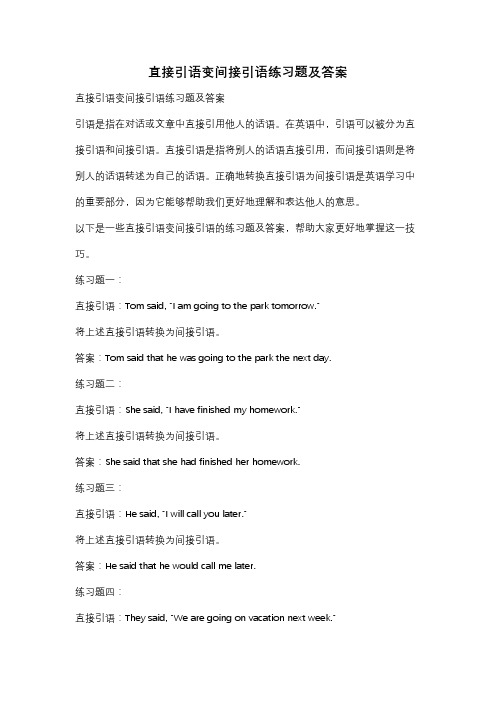
直接引语变间接引语练习题及答案直接引语变间接引语练习题及答案引语是指在对话或文章中直接引用他人的话语。
在英语中,引语可以被分为直接引语和间接引语。
直接引语是指将别人的话语直接引用,而间接引语则是将别人的话语转述为自己的话语。
正确地转换直接引语为间接引语是英语学习中的重要部分,因为它能够帮助我们更好地理解和表达他人的意思。
以下是一些直接引语变间接引语的练习题及答案,帮助大家更好地掌握这一技巧。
练习题一:直接引语:Tom said, "I am going to the park tomorrow."将上述直接引语转换为间接引语。
答案:Tom said that he was going to the park the next day.练习题二:直接引语:She said, "I have finished my homework."将上述直接引语转换为间接引语。
答案:She said that she had finished her homework.练习题三:直接引语:He said, "I will call you later."将上述直接引语转换为间接引语。
答案:He said that he would call me later.练习题四:直接引语:They said, "We are going on vacation next week."将上述直接引语转换为间接引语。
答案:They said that they were going on vacation the following week.练习题五:直接引语:She said, "I can't come to the party tonight."将上述直接引语转换为间接引语。
答案:She said that she couldn't come to the party that night.练习题六:直接引语:He said, "I have been studying English for five years."将上述直接引语转换为间接引语。
直接引语变间接引语讲解及练习
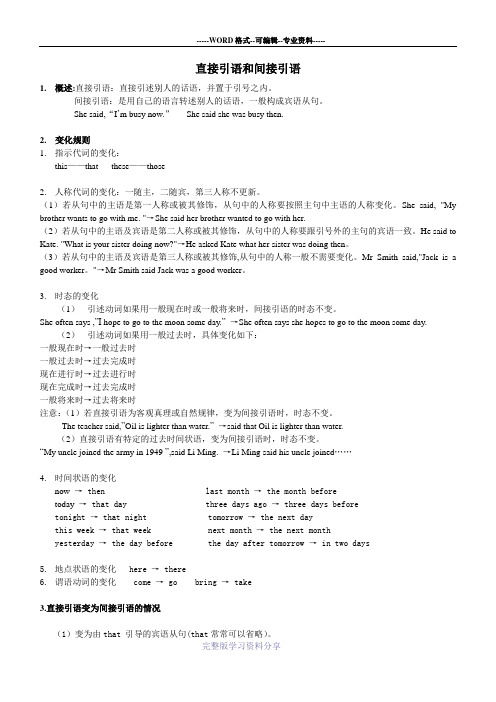
直接引语和间接引语1.概述:直接引语:直接引述别人的话语,并置于引号之内。
间接引语:是用自己的语言转述别人的话语,一般构成宾语从句。
She said,“I’m busy now.”She said she was busy then.2. 变化规则1.指示代词的变化:this——that these——those2.人称代词的变化:一随主,二随宾,第三人称不更新。
(1)若从句中的主语是第一人称或被其修饰,从句中的人称要按照主句中主语的人称变化。
She said, "My brother wants to go with me. "→She said her brother wanted to go with her.(2)若从句中的主语及宾语是第二人称或被其修饰,从句中的人称要跟引号外的主句的宾语一致。
He said to Kate. "What is your sister doing now?"→He asked Kate what her sister was doing then。
(3)若从句中的主语及宾语是第三人称或被其修饰,从句中的人称一般不需要变化。
Mr Smith said,"Jack is a good worker。
"→Mr Smith said Jack was a good worker。
3.时态的变化(1)引述动词如果用一般现在时或一般将来时,间接引语的时态不变。
She often says ,”I hope to go to the moon some day.”→She often says she hopes to go to the moon some day.(2)引述动词如果用一般过去时,具体变化如下:一般现在时→一般过去时一般过去时→过去完成时现在进行时→过去进行时现在完成时→过去完成时一般将来时→过去将来时注意:(1)若直接引语为客观真理或自然规律,变为间接引语时,时态不变。
初中英语语法:直接引语变间接引语详解附练习及答案

直接引语和间接引语Direct speech and Indirect speech1.什么是直接引语?----直接引述别人的原话,一般加冒号,且没有时态呼应的问题;如:He said, “I’m afraid I can’t finish the work.”2.什么是间接引语?-----用自己的话转述别人的话,不用引号,通常情况构成宾语从句,从句中的语序,时态,人称,时间状语,地点状语,和指示代词等都有变化。
如:He said that he was afraid he couldn’t finish the work.3. 为什么要把直接引语变成间接引语?----当你需要转述别人的话的时候就需要用到;除了用say,还可以用tell, ask等。
4.所转述的内容可以是陈述句,疑问句,特殊疑问句,祈使句,感叹句,这几种情况下该怎么将直接引语变成间接引语呢?只要记住刚刚说的那6点:语序,时态,人称,时间状语,地点状语,和指示代词,记住相对应的变化规则,那么就不是一件难事。
下面我们来看例子:直接引语:He said, “My dad will be back tomorrow morning”间接引语:He said that his dad would be back the next/following morning..我们来分析一下这个例句,时态,人称,时间状语都发生了变化My dad---his dad, will be back---would be back, tomorrow morning---the next/following morning一、下面我们先看时态不变的5种情况:1)直接引语是客观真理,自然现象,名言,俗语,或者与一个具体的过去时间连用说明客观事实时,不管主句的谓语动词是什么时态,变为间接引语的时候时态均不变,如:Eg.1---“The earth moves around the sun,” the teacher told us.The teacher told us the earth moves around the sun.Eg.2---He said, “I was born in Guangdong in 1990”.He said he was born in Guangdong in 1990.Eg.3---Goethe said, “The important thing in life is to have a great aim, and the determination to attain it.”Goethe said the important thing in life is to have a great aim, and the determination to attain it.Eg.4:He said, “Practice makes perfect.”He said that practice makes perfect.2)主句的谓语动词是现在是或将来时,变成间接引语时时态不变Eg.1---He says, “I finished the work.”He says he finished the work.Eg.2---He will say, “I have watered the flower.”He will say he has watered the flower.Eg.3---He will say, “I will try my best to help you.”He will say he will try his best to help me.3)直接引语如果是一般现在时,表示反复出现或习惯性动作,变为间接引语时时态不变。
初中英语直接引语和间接引语讲解与训练
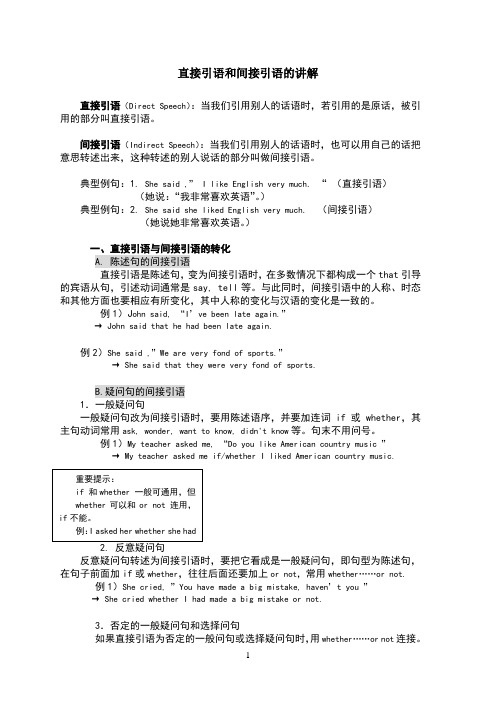
直接引语和间接引语的讲解直接引语(Direct Speech):当我们引用别人的话语时,若引用的是原话,被引用的部分叫直接引语。
间接引语(Indirect Speech):当我们引用别人的话语时,也可以用自己的话把意思转述出来,这种转述的别人说话的部分叫做间接引语。
典型例句:1. She said ,” I like English very much. “(直接引语)(她说:“我非常喜欢英语”。
)典型例句:2. She said she liked English very much. (间接引语)(她说她非常喜欢英语。
)一、直接引语与间接引语的转化A. 陈述句的间接引语直接引语是陈述句,变为间接引语时,在多数情况下都构成一个that引导的宾语从句,引述动词通常是say, tell等。
与此同时,间接引语中的人称、时态和其他方面也要相应有所变化,其中人称的变化与汉语的变化是一致的。
例1)J ohn said, “I’ve been late again.”→ John said that he had been late again.例2)She said ,”We are very fond of sports.”→ She said that they were very fond of sports.B.疑问句的间接引语1.一般疑问句一般疑问句改为间接引语时,要用陈述语序,并要加连词if 或 whether,其主句动词常用ask, wonder, want to know, didn't know等。
句末不用问号。
例1)My teacher asked me, “Do you like American country music ”→ My teacher asked me if/whether I liked American country music.反意疑问句转述为间接引语时,要把它看成是一般疑问句,即句型为陈述句,在句子前面加if或whether,往往后面还要加上or not,常用whether……or not.例1)She cried, ”You have made a big mistake, haven’t you ”→ She cried whether I had made a big mistake or not.3.否定的一般疑问句和选择问句如果直接引语为否定的一般问句或选择疑问句时,用whether……or not连接。
初中语法-直接引语转换间接引语讲解-附练习题及答案
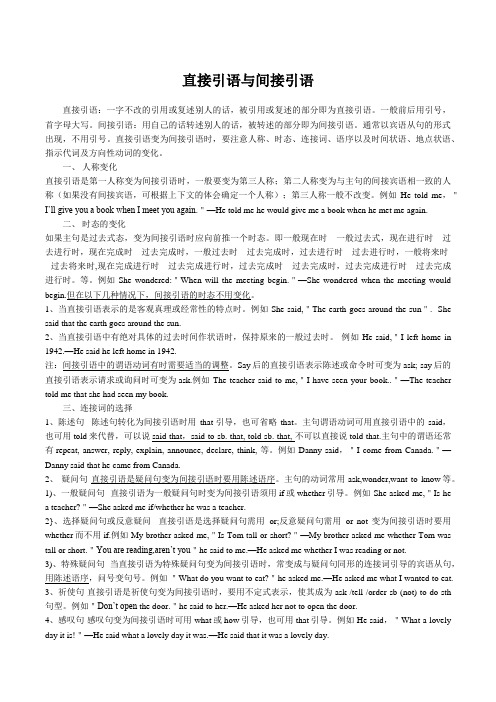
直接引语与间接引语直接引语:一字不改的引用或复述别人的话,被引用或复述的部分即为直接引语。
一般前后用引号,首字母大写。
间接引语:用自己的话转述别人的话,被转述的部分即为间接引语。
通常以宾语从句的形式出现,不用引号。
直接引语变为间接引语时,要注意人称、时态、连接词、语序以及时间状语、地点状语、指示代词及方向性动词的变化。
一、人称变化直接引语是第一人称变为间接引语时,一般要变为第三人称;第二人称变为与主句的间接宾语相一致的人称(如果没有间接宾语,可根据上下文的体会确定一个人称);第三人称一般不改变。
例如He told me,"I’ll give you a book when I meet you again."—He told me he would give me a book when he met me again.二、时态的变化如果主句是过去式态,变为间接引语时应向前推一个时态。
即一般现在时---一般过去式,现在进行时---过去进行时,现在完成时---过去完成时,一般过去时---过去完成时,过去进行时---过去进行时,一般将来时---过去将来时,现在完成进行时---过去完成进行时,过去完成时---过去完成时,过去完成进行时---过去完成进行时。
等。
例如She wondered:"When will the meeting begin."—She wondered when the meeting would begin.但在以下几种情况下,间接引语的时态不用变化。
1、当直接引语表示的是客观真理或经常性的特点时。
例如 She said,"The earth goes around the sun".--She said that the earth goes around the sun.2、当直接引语中有绝对具体的过去时间作状语时,保持原来的一般过去时。
例如 He said,"I left home in 1942.—He said he left home in 1942.注:间接引语中的谓语动词有时需要适当的调整。
- 1、下载文档前请自行甄别文档内容的完整性,平台不提供额外的编辑、内容补充、找答案等附加服务。
- 2、"仅部分预览"的文档,不可在线预览部分如存在完整性等问题,可反馈申请退款(可完整预览的文档不适用该条件!)。
- 3、如文档侵犯您的权益,请联系客服反馈,我们会尽快为您处理(人工客服工作时间:9:00-18:30)。
直接引语和间接引语Direct speech and Indirect speech1.什么是直接引语?----直接引述别人的原话,一般加冒号,且没有时态呼应的问题;如:He said, “I’m afraid I can’t finish the work.”2.什么是间接引语?-----用自己的话转述别人的话,不用引号,通常情况构成宾语从句,从句中的语序,时态,人称,时间状语,地点状语,和指示代词等都有变化。
如:He said that he was afraid he couldn’t finish the work.3. 为什么要把直接引语变成间接引语?----当你需要转述别人的话的时候就需要用到;除了用say,还可以用tell, ask等。
4.所转述的内容可以是陈述句,疑问句,特殊疑问句,祈使句,感叹句,这几种情况下该怎么将直接引语变成间接引语呢?只要记住刚刚说的那6点:语序,时态,人称,时间状语,地点状语,和指示代词,记住相对应的变化规则,那么就不是一件难事。
下面我们来看例子:直接引语:He said, “My dad will be back tomorrow morning”间接引语:He said that his dad would be back the next/following morning..我们来分析一下这个例句,时态,人称,时间状语都发生了变化My dad---his dad, will be back---would be back, tomorrow morning---the next/following morning 一、下面我们先看时态不变的5种情况:1)直接引语是客观真理,自然现象,名言,俗语,或者与一个具体的过去时间连用说明客观事实时,不管主句的谓语动词是什么时态,变为间接引语的时候时态均不变,如:“The earth moves around the sun,” the teacher told us.The teacher told us the earth moves around the sun.said, “I was born in Guangdong in 1990”.He said he was born in Guangdong in 1990.said, “The important thing in life is t o have a great aim, and the determination to attain it.”Goethe said the important thing in life is to have a great aim, and the determination to attain it.:He said, “Practice makes perfect.”He said that practice makes perfect.2)主句的谓语动词是现在是或将来时,变成间接引语时时态不变says, “I finished the work.”He says he finished the work.will say, “I have watered the flower.”He will say he has watered the flower.will say, “I will try my best to help you.”He will say he will try his best to help me.3)直接引语如果是一般现在时,表示反复出现或习惯性动作,变为间接引语时时态不变。
said, “My brother always goes to school by bike.”Jack said his brother always goes to school by bike.mother said, “I like on-line shopping.”My mother said she likes on-line shopping.4)直接引语是过去进行时,或者是过去完成时时,变为间接引语时,时态不变,如said, “Lucy, where were you going when I met you near the shop?”Jim asked Lucy where she was going when he met her near the shop.said, “Tom was having video meeting at 9 o’clock last night.”Kelly said Tom was having video meeting at 9 o’cloc k last nightsaid, “I had called Tom before lunch.”John said he had called Tom before lunch.5)should, would ought, had better, might, used to, could, must没有对应的过去式,所以在间接引语中时态一般不变,如:said, “You had better come here today.”Jason said I had better come here today.什么情况下时态需要变化?请看时态变化表格,当主句时态是一般过去式时:1. 一般现在时---一般过去式2. 一般过去时---过去完成时3. 一般将来时---过去将来时4. 现在进行时---过去进行时5. 现在完成时---过去完成时6. 现在完成进行时---过去完成进行时例句:1)He said, “I am very tired.”(一般现在时---一般过去时)----He said he was very tired.----He says he is very tired.2) “Are you tired?” she asked.----She asked if I was tired..----She asks if I am tired.3)Tom asked, “Will Jack arrive tomorrow?”(一般将来时—过去将来时)Tom asked if/whether Jack would arrive tomorrow.Tom asks if/whether Jack will arrive tomorrow.4)She aske d, “When will Jack arrive?”She asked when Jack would arrive.She asks when Jack will arrive.5)“I broke that plate.” He said.(一般过去时---过去完成时)He said he had broken the plate.He says he broke that plate.He told me that he had broken that plate.5)He said, “You told me this story.”He said I had told him that story.He says I told him that story.6)He said, “I met Mr. Smith this morning.”He said he had met Mr. Smith that morning.7)He said, “I am using the knife.”(现在进行时---过去进行时)He said he was using the knife.8)My mother said, “Your sister is washing her face now.”My mother said my sister is washing her face then.9)He said to me, “She’s left her book in your room.”(现在完成时---过去完成时)He told me that she had left her book in my room.10)Mr. Jones said, “I have just finished work.”Mr. Jones said he had just finished work.11)She said, “I have not heard from him since May.”She said she had not heard from him since May.12)现在完成进行时---过去完成进行时二、接下来我们来看看人称是怎么变化的:1、人称的转变1)直接引语中的第一人称,一般转换为第三人称,如:He said,“I am very sorry.” ——>He said that he was very sorry.2)直接引语中的第二人称,如果原话是针对转述人说的,转换为第一人称,如:“You should be more careful next time,” my father told me.——>My father told me that I should be more careful the next time.3)直接引语中的第二人称,如果原话是针对第三人称说的,转换成第三人称。
如:S he said to her son, “I'll check your homework tonight.” ——>She said to her son that she would check his homework that night.4)人称的转换包括人称代词、物主代词和名词性物主代词等,如:He asked me, “Will you go to the station with me to meet a friend of mine this afternoon?” ——> He asked me whether I would go to the station with him to meet a friend of his that afternoon.总之,人称的转换不是固定的,具体情况,具体对待,要符合逻辑。
三、下面来看看时间状语,地点状语,还有指示代词的变化:She said, “I'll go there tomorrow.”她说:“明天我将去那儿。
